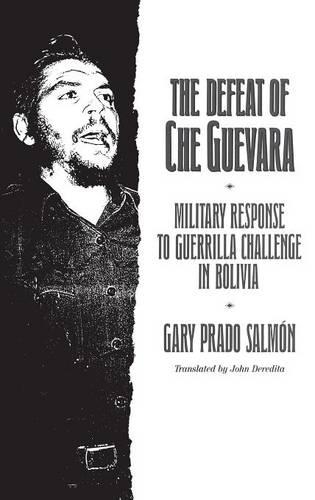
The Defeat of Che Guevara: Military Response to Guerrilla Challenge in Bolivia
(Hardback)
Publishing Details
The Defeat of Che Guevara: Military Response to Guerrilla Challenge in Bolivia
By (Author) Gary Prado Salmon
By (author) John Deredita
By (author) Larence H. Hall
Bloomsbury Publishing PLC
Praeger Publishers Inc
24th July 1990
United States
Classifications
Tertiary Education
Non Fiction
Revolutionary groups and movements
Revolutions, uprisings, rebellions
322.420984
Physical Properties
Hardback
304
Width 156mm, Height 235mm
652g
Description
A thoroughly documented account of the 1967 guerrilla challenge in Bolivia, this volume reconstructs events leading up to, during, and after the defeat of the insurgency. Against the background of the 1960s' attempt to extend Cuban influence throughout Latin America, the book offers an analysis of trends in Bolivian politics from 1952 to 1967. General Prado then evaluates the geographical setting of the insurgency, guerrilla preparations, and the Bolivian response. Prado identifies key strategic errors, including Che Guevara's failure to capture peasant support, and analyzes Che's own theories. Military historians will find no sensational revelations here but, instead, previously unknown details that form a concise reconstruction of The Defeat of Che Guevara. Recently retired from the Bolivian Army, Prado avoids partisan tones and provides an unusually balanced account of the 1967 guerrilla insurgency in Bolivia. A four-part volume, Part I presents a thorough discussion of the international, national, and military climate. Part II assesses the geographical setting. Part III details operations from preparations to defeat. The volume concludes with a thorough evaluation of the insurgency--causes for its failure, an analysis of Che Guevara's theories, and the Bolivian army's mistakes.
Reviews
Captain Gary Prado Salmon commanded the unit that captured Che Guevara in Bolivia in 1967. Prado also grew up in Vallegrande where Guevara established his base. His reflective, intelligent, insightful, and candid book will stand as an authoritative, if unofficial, account of the sad demise of the most flamboyant Latin American guerrilla fighter of the 20th century. Based on the field diaries of Guevara as well as on Bolivian military sources, Prado's book dispassionately discusses the difficult local geography, the local and international climate at the time, and the entire operations of both sides on virtually a daily basis. Prado evaluates the strategies and errors of both the guerrillas and the Bolivian army, and he clarifies the confusion surrounding the death of Guevara. The Bolivian guerilla campaign suffered from poor planning, limited resources, and a pathetic ignorance of local geography, politics, and history. Adequately translated and readable, this book is enhanced with maps and photographs. All levels.-Choice
"Captain Gary Prado Salmon commanded the unit that captured Che Guevara in Bolivia in 1967. Prado also grew up in Vallegrande where Guevara established his base. His reflective, intelligent, insightful, and candid book will stand as an authoritative, if unofficial, account of the sad demise of the most flamboyant Latin American guerrilla fighter of the 20th century. Based on the field diaries of Guevara as well as on Bolivian military sources, Prado's book dispassionately discusses the difficult local geography, the local and international climate at the time, and the entire operations of both sides on virtually a daily basis. Prado evaluates the strategies and errors of both the guerrillas and the Bolivian army, and he clarifies the confusion surrounding the death of Guevara. The Bolivian guerilla campaign suffered from poor planning, limited resources, and a pathetic ignorance of local geography, politics, and history. Adequately translated and readable, this book is enhanced with maps and photographs. All levels."-Choice
Author Bio
GARY PRADO SALMON is a recently retired General in the Bolivian Army. He has spent two decades accumulating materials and preparing charts in his efforts to reconstruct accurately the events of 1967--an important part of contemporary Bolivian history. JOHN DEREDITA is a critic and translator. He has taught Latin American literature at Bryn Mawr College, Columbia University, and other institutions. LAWRENCE H. HALL is a retired U.S. Army officer who taught in the Department of Foreign Languages at the United States Military Academy. He took a doctorate in Latin American history from New York University and has been teaching in that field at Connecticut College.
